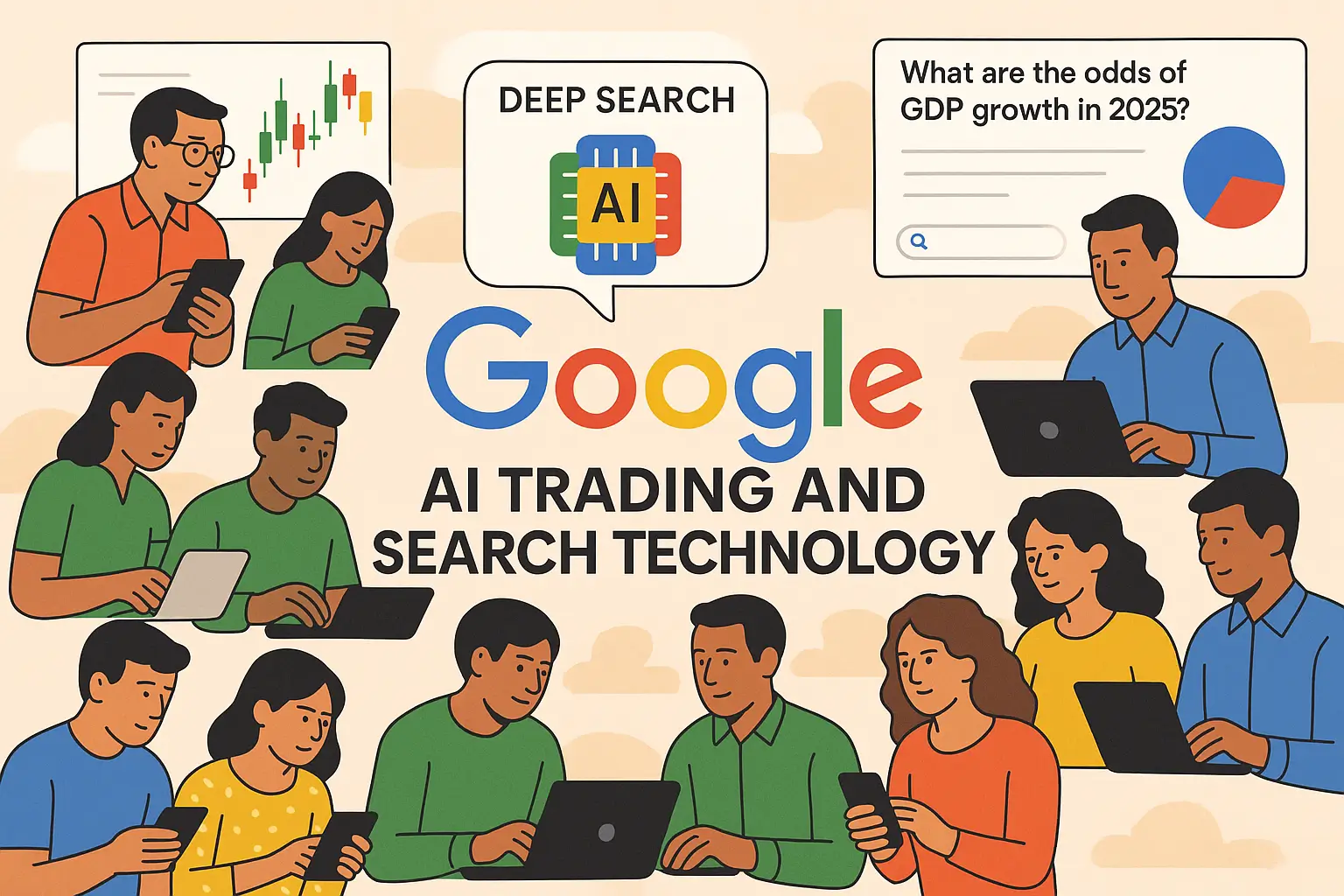Google has rolled out new capabilities that merge its massive search and AI infrastructure with financial markets. A few key highlights:
- With its platform Google Finance, Google now includes a “Deep Search” option powered by the Gemini AI models. Users can ask complex questions about markets — e.g., “How does inflation impact the S&P 500 relative to the Nasdaq under credit-spread expansion?” — and get a fully cited, comprehensive answer.
- Google Finance is also integrating prediction-market data (from services like Kalshi and Polymarket), so users can inquire about probabilities of future events — e.g., “What’s the odds of GDP growth in 2025?” — directly within Google’s interface.
- On the search side, Google’s broader AI enhancements (via its Gemini and “AI Mode”) are changing how people search: longer queries, conversational style, multimodal inputs (text, image).
What this means: The barrier between “searching for information” and “making trading/financial decisions” is getting more porous. You don’t just search, you ask smart, multi-layered questions; you don’t just look at charts, you get AI‐driven insights and probabilities.
Why Many People Are Using It
There are several motivating factors:
- Lowering complexity – Markets are complex: macro indicators, earnings, sentiment, etc. Having an AI that can pull together many threads and offer a narrative (with citations) can make analysis more accessible.
- Speed & convenience – Instead of hunting multiple sources manually, you can ask a well-framed question and get aggregated insights quickly.
- Novel data inputs – The inclusion of prediction-market data means you’re not just looking at historical or conventional data, but what the “wisdom of the crowd” expects about the future.
- Search evolution – As search becomes more conversational and AI-powered, users who were only browsing now feel empowered to ask deeper questions (including about trading/finance).
- Democratization – Tools that once were available only to institutional investors (e.g., advanced charting, research aggregation) are being made more accessible to retail users.
Assumptions to Challenge & Risks
As your intellectual sparring partner, DharTee, let’s question some assumptions and explore risks:
- Assumption: AI = objective truth.
- While AI can aggregate and reason, it is still reliant on input data, models, and the design of the system. There’s risk of bias, mis-interpretation, or over-confidence in the answer.
- Assumption: Prediction markets are infallible.
- Prediction markets provide probabilities, but they don’t guarantee outcomes. Market events can still surprise, and correlation ≠ causation.
- Assumption: More data/analysis always leads to better trading decisions.
- More information can lead to paralysis, over-trading, or chasing noise. The human element of judgment, risk control, and behavior remains crucial.
- Risk: Over-reliance on Google’s ecosystem.
- If many traders begin to use the same AI/insight tools, crowd behaviour may converge, reducing the edge. What was once differential may become common.
- Risk: The “search becomes answer” effect.
- With AI providing answers directly, rather than links to other sites, there’s concern that users might stop exploring deeper sources. This could reduce diversity of views and may lead to echo chambers.
Implications & What to Watch
- For retail traders/investors, this means the playing field is changing: you have tools previously reserved for institutional use, but you will need to develop how to use them wisely (question framing, interpreting AI responses, blending with human judgment).
- For content creators/finance educators, the mode of how people find and consume information is shifting — from websites to AI summarizations. This affects how you provide value.
- For markets overall, if more participants use similar AI-driven tools, the dynamics of informational advantage may shift.
- For emerging markets (like India), Google is rolling out these tools in English + Hindi, expanding access.
Conclusion
Google’s recent advances show a convergence of search and finance/trading: AI-augmented search platforms becoming tools for market insight. For many people, this opens exciting opportunities — more power to ask big questions, get faster answers. But with the power comes responsibility: to remain critical, to not mistake AI output for unchallengeable truth, and to retain discipline in trading/investing.

Comments